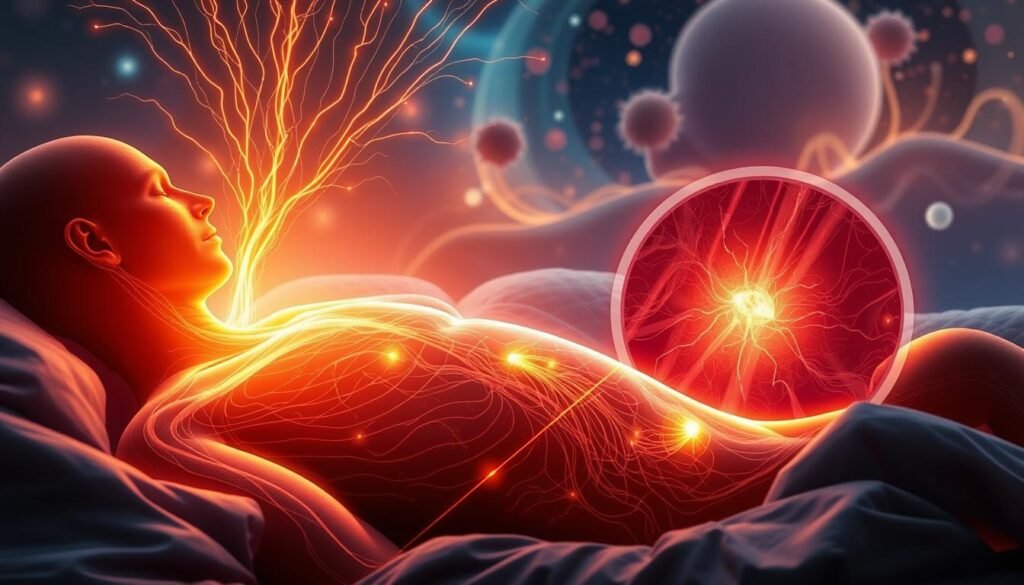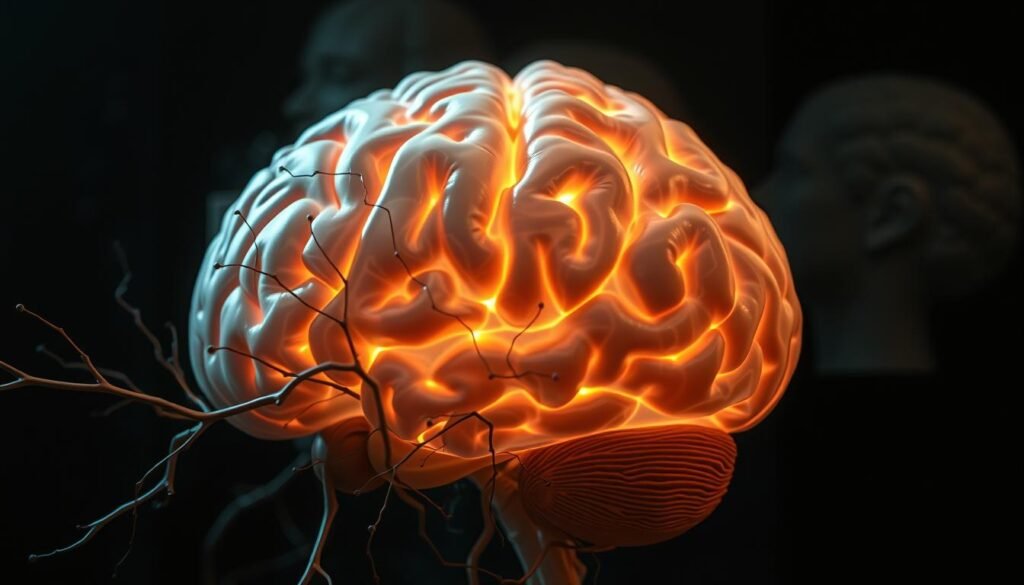Did you know 35% of American adults don’t get the 8 hours of sleep they need? This is a big health problem that affects millions. Learning about the benefits of 8 hours of sleep can really improve your health and unlock your full potential.
Sleep is not just a time to rest. It’s a powerful process that helps your body and mind. When you get enough sleep, your body and mind go through amazing changes that help you stay healthy.
Getting enough sleep does more than just make you feel good. Your body starts a healing process that fixes tissues, balances hormones, and helps your brain work better.
Key Takeaways
- 8 hours of sleep is crucial for optimal health and wellness
- Sleep supports comprehensive body restoration
- Consistent sleep patterns enhance physical and mental performance
- Quality sleep impacts hormone regulation and metabolism
- Lack of sleep can significantly compromise overall health
Understanding the Science Behind 8 Hours of Sleep
Sleep is a complex process that’s vital for your health. It’s how your body fixes and renews itself at night. The science behind 8 hours of sleep shows how amazing this process is.
Your body has a natural sleep-wake cycle, or circadian rhythm. It tells you when to sleep and when to wake up. Knowing why 8 hours of sleep is key starts with understanding this system.
The Natural Sleep-Wake Cycle
Your circadian rhythm is influenced by several things:
- Light exposure
- Hormone production
- Body temperature
- External environmental cues
Sleep Stages and Their Functions
Good sleep affects your health through different stages. Your sleep cycle includes various phases:
| Sleep Stage | Key Functions |
|---|---|
| Non-REM Stage 1 | Light sleep, muscle relaxation begins |
| Non-REM Stage 2 | Body temperature drops, heart rate slows |
| Non-REM Stage 3 | Deep physical restoration occurs |
| REM Sleep | Mental processing and memory consolidation |
Why Eight Hours is the Magic Number
Research shows that 8 hours of sleep lets your body finish full sleep cycles. Your brain processes info, fixes cells, and gets ready for the next day.
Sleep is not just a rest, but a healing and rejuvenating process.
By aiming for 8 hours of sleep, you help your body’s natural rhythms. This boosts your health and performance.
How Your Brain Benefits from a Full Night’s Rest
Your brain works hard while you sleep, doing important tasks. Getting 8 hours of sleep makes it a top-notch restoration center. It boosts your thinking skills and mental health.
During sleep, your brain cleans up through the glymphatic system. This process removes toxins that build up when you’re awake. It’s like your brain does a nightly deep clean, keeping your mind sharp.
- Memory Consolidation: Sleep helps transfer short-term memories to long-term storage
- Creativity Enhancement: Neural connections strengthen during rest
- Stress Reduction: Brain chemicals rebalance during deep sleep stages
What happens in 8 hours of sleep is amazing. Your brain goes through different stages, each vital for thinking well. Deep sleep stages are key for mental refresh, helping your brain tackle tomorrow’s tasks.
“Sleep is the golden chain that binds health and our bodies together.” – Thomas Dekker
Studies show sleep affects your brain and metabolism. Regular sleep improves your decision-making, emotional control, and mental focus. It’s like a nightly reset for your brain.
Your brain’s ability to handle info, learn, and stay balanced depends on sleep. Getting enough sleep is essential for your brain’s health. It’s not just a luxury; it’s a must.
The Impact of Quality Sleep on Your Physical Health
Sleep is key to keeping your body healthy. It helps your body fix and grow stronger. This makes you feel better and more alive.
Muscle Recovery and Growth
Your body fixes muscles while you sleep. Deep sleep is when your body makes growth hormone. This hormone is vital for sleep and body recovery.
Athletes know that good sleep helps muscles grow and heal faster.
- Promotes protein synthesis
- Reduces muscle inflammation
- Supports tissue regeneration
Cardiovascular System Benefits
Good sleep is great for your heart. It helps keep your blood pressure in check. This reduces stress on your heart.
| Sleep Duration | Cardiovascular Impact |
|---|---|
| 7-9 hours | Optimal heart health protection |
| Less than 6 hours | Increased heart disease risk |
Immune System Enhancement
Your immune system and sleep are closely linked. Sleep helps your body make proteins that fight off sickness. Good sleep keeps your immune system strong.
Quality sleep is your body’s natural immune booster.
Getting 7-9 hours of sleep each night makes you healthier and stronger.
What Happens to Your Body When You Sleep 8 Hours Every Night

When you sleep for 8 hours every night, your body does more than just rest. It undergoes amazing changes that affect your health and well-being in many ways.
At night, your body starts a deep healing process. This process is complex and powerful. It repairs and refreshes your body at a cellular level.
- Muscle tissue regenerates and grows stronger
- Immune system cells are produced and activated
- Brain neural pathways are cleaned and reinforced
- Hormones are balanced and regulated
Your body heals during sleep through detailed biological processes. Protein synthesis accelerates, fixing muscle, organ, and tissue damage. Growth hormone release peaks, helping with physical recovery and cell maintenance.
Resting your mind is just as important. Your brain sorts through emotions, strengthens memories, and removes toxins. This nightly reset boosts your mental sharpness, emotional strength, and clarity.
“Sleep is the golden chain that binds health and our bodies together.” – Unknown
By making sleep a priority, you’re investing in your overall health. You’re supporting your body’s natural healing and growth.
Sleep’s Role in Hormonal Balance and Weight Management
Learning about the link between sleep and weight management is a big deal for anyone wanting to be healthy. Does sleeping 8 hours help you lose weight? Yes, it does. Your body’s hormonal balance is key to controlling your metabolism, appetite, and weight.
Sleep greatly affects your hormones, especially two important ones: leptin and ghrelin. These hormones control how hungry you feel.
Leptin and Ghrelin: The Hunger Hormone Duo
Good sleep keeps these hormones in balance:
- Leptin tells you when you’re full and helps you eat less
- Ghrelin makes you hungry and want to eat more
Not enough sleep messes with this balance. This can make you:
- Feel hungrier
- Eat more calories
- Burn calories less efficiently
Cortisol and Stress Management
Sleep and weight are closely tied through cortisol, the stress hormone. Not enough sleep raises cortisol levels. This can:
| Cortisol Effect | Impact on Body |
|---|---|
| Increased Levels | Makes you store more fat |
| Disrupted Sleep Patterns | Makes you eat more because of stress |
| Metabolic Slowdown | Slows down how you burn calories |
Getting 8 hours of quality sleep is a strong strategy for managing your weight. Knowing how hormones work can help you sleep better. This supports a healthier metabolism and weight.
How Consistent Sleep Improves Your Mental Health

Getting quality sleep is a powerful tool for boosting your mood and energy. Your mental health is closely tied to how much and how well you sleep each night. When you get eight hours of sleep, you gain big psychological benefits that change your daily life.
Sleep is key for managing emotions and staying mentally strong. During deep sleep, your brain sorts out complex feelings and experiences. This helps you handle stress better. It can also lower symptoms of anxiety and depression.
- Stabilizes emotional responses
- Reduces stress hormone levels
- Enhances psychological recovery
- Improves overall mental clarity
Proper sleep has long-term benefits beyond just feeling better. It makes your brain work better and helps you feel more balanced. Sleeping well helps you connect better with others, feel more confident, and see the world in a more positive light.
“Sleep is the golden chain that binds health and our bodies together.” – Thomas Dekker
Make sleep a priority by aiming for eight hours each night. Quality sleep improves your lifestyle by giving your brain the recovery it needs. This lets you tackle daily challenges with more emotional strength and mental resilience.
The Connection Between Sleep and Skin Health
Your skin is a dynamic organ that thrives on rest. When you get 8 hours of sleep, your body enters a remarkable regeneration mode. This transforms your skin from the inside out. Cell repair and regeneration become the primary focus during these crucial nighttime hours.
During sleep, your body resets and initiates critical processes that directly impact skin health. The 8 hours of sleep benefits for skin are profound and multifaceted. They create a natural healing environment for your largest organ.
Collagen Production During Sleep
Sleep triggers an impressive collagen production cycle. Your skin works overtime to:
- Rebuild damaged skin cells
- Increase protein synthesis
- Reduce inflammation
- Enhance skin elasticity
Cell Repair and Regeneration Mechanisms
The nighttime cellular repair process is like a sophisticated maintenance system. Your body releases growth hormones that accelerate skin recovery. They help to:
- Repair environmental damage
- Reduce oxidative stress
- Promote faster wound healing
- Minimize signs of aging
Pro tip: Consistent sleep patterns are your skin’s best defense against premature aging and external stressors.
Your skin doesn’t just rest during sleep—it actively works to restore and rejuvenate itself.
Sleep’s Impact on Memory and Learning

Your brain changes a lot during sleep. It’s not just rest. Deep sleep helps your brain fix and learn new things.
Getting a full night’s sleep is good for your brain. It helps with:
- Memory Consolidation: Your brain makes connections stronger
- Information Processing: It turns complex experiences into memories
- Problem-Solving Skills: It makes you think more creatively
Deep sleep is like a detox for your brain. It clears out toxins and waste. This keeps your brain healthy and protects it from damage.
Sleep is not just rest—it’s a sophisticated neurological maintenance program for your brain.
Studies show that good sleep boosts learning. When you sleep well, your brain stores information better. This makes learning easier and more effective.
Eight hours of sleep is like upgrading your brain. It improves your memory, mental clarity, and how well you think.
How Regular Sleep Patterns Boost Energy Levels
Your body’s energy production is amazing and needs consistent, quality sleep. The right amount of sleep is key to keeping your energy up all day.
Learning how sleep helps your body shows how it restores energy at a deep level. Sleep is not just rest; it’s a time for your body to recharge and get ready for the next day.
ATP Production During Rest
When you sleep, your body starts to recharge. It makes a lot of adenosine triphosphate (ATP), which is like fuel for your cells. This process includes:
- Mitochondrial regeneration
- Metabolic waste clearance
- Cellular repair and recovery
“Sleep is the golden chain that binds health and our bodies together.” – Thomas Dekker
Cellular Recovery Process
Why sleep is important becomes clear when you look at how your body recovers. Your body does important work during sleep, making sure you have the energy you need.
| Sleep Stage | Energy Recovery Process | Duration |
|---|---|---|
| Deep Sleep | Intense Cellular Repair | 1-2 hours |
| REM Sleep | Brain Energy Restoration | 1-2 hours |
| Light Sleep | Initial Recovery | 4-5 hours |
Getting the most out of your sleep means your body’s energy systems work best. This lets you face the day with more energy and excitement.
Conclusion
Learning how to sleep better can change your life. A full night’s sleep does more than just make you feel rested. It makes you healthier and more alive.
Your body and mind change a lot while you sleep. Sleeping for eight hours improves your health, mind, and mood. It boosts your immune system and sharpens your thinking.
To sleep well, make your bedroom comfy. Keep it cool, avoid screens before bed, and sleep at the same time every night. These small steps can make a big difference in how you feel.
See sleep as a key part of staying healthy. Sleeping for eight hours each night is like investing in yourself. It’s the first step to feeling your best.





